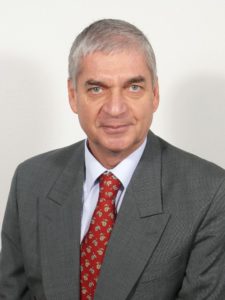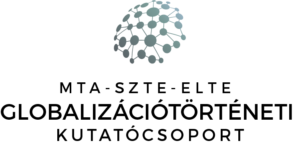
Prof. em. Dr. Karsai László
professzor emeritus
Érdeklődési terület: a roma és a zsidó holokauszt története, a nácizmus, antiszemitizmus, nacionalizmus története, Európa 20. századi történelme.
E-mail: karsai@hist.u-szeged.hu
Telefon: (+36) 62-546-795
Iroda: Petőfi Sándor sgt. 30-34. („Petőfi épület”), 125. szoba
Karsai László professzor emeritus az ELTE történelem–Kelet-Európa szakján végezte tanulmányait Budapesten. A dr. univ. fokozatot 1979-ben szerezte meg, kandidátusi (PhD) fokozatát pedig 1993-ban kapta meg. Sikeres habilitálására 1999-ben került sor, majd 2014-ben az MTA doktora fokozatot is kiérdemelte.
A magyarországi roma és zsidó holokauszt, a magyar szélsőjobboldali mozgalmak, elsősorban a Nyilaskeresztes Párt történetének nemzetközileg elismert kutatója.
1994 óta vezeti a Jad Vasem Levéltár Magyarországi kutatócsoportját. 2003 és 2006 között az első hazai holokauszt-kiállítás történelmi főtanácsadója volt a budapesti Páva utcában. Az EHRI (European Holocaust Research Infrastructure) tanácsadó testületének tagja 2010-2015 között.
Számos izraeli és észak-amerikai kutatóintézet és egyetem vendégtanáraként és tudományos munkatársaként is tevékenykedett, többek között a Yad Vashem International Institute for Holocaust Studies (Jeruzsálem), a United States Holocaust Memorial Museum (Washington) és a Columbia University (New York) meghívására.
Hét könyv szerzője, több további kötet szerkesztője és számos tudományos cikk megalkotója.
Szakmai önéletrajz
Karsai László
Születési hely és idő: Budapest, 1950. szeptember 20.
Munkahely címe: Szegedi Tudományegyetem, BTK, Jelenkortörténeti Tanszék, 6722 Szeged, Egyetem utca 2.
Tel.: (+36) 62-546-795, fax: (+36) 62-544-464
E-mail: karsai@hist.u-szeged.hu
Tanulmányok
1970-1975
ELTE BTK, történelem szak
1978
egyetemi doktori fokozat
1992
Ph.D. fokozat (disszertáció címe: A cigány holokauszt Magyarországon)
1998
habilitáció (Pécsi Tudományegyetem–BTK, habilitációs előadásom címe: Szálasi Ferenc politikai életrajza)
2014
MTA doktora fokozat (disszertáció címe: Szálasi Ferenc. Politikai életrajz)
2014
MTA doktora fokozat (disszertáció címe: Szálasi Ferenc. Politikai életrajz)
Korábbi munkahelyek
1975-1987
oktató és kutató, József Attila Tudományegyetem, Szeged
1987-1994
kutató, MTA Történettudományi Intézet, Budapest
1994-2016
oktató és kutató, Szegedi Tudományegyetem
Ösztöndíjak, tanulmányutak
1980
Párizs (3 hónap)
1984
Brüsszel – Université Libre de Bruxelles (3 hónap)
1992
Amsterdam – University of Amsterdam (2 hónap)
1993
New York – American Council of Learned Societies (6 hónap)
1994
Zürich – Eidgenössische Technische Hochschule (1 hónap), Róma – Centro Nazionale di Ricerca (1 hónap)
1998
Washington, D. C. – United States Holocaust Memorial Museum (2 hónap)
1999
New York – Columbia University (2 hónap)
2000
Jeruzsálem – Yad Vashem (4 hónap)
2001
Párizs – Ministère des Affaires Etrangères (1 hónap)
2003
Róma (2 hónap)
2009
Washington, D. C. – United States Holocaust Memorial Museum (3 hónap)
2014
Jerusalem, Israel – Yad Vashem, International Center for Holocaust Studies (4 hónap)
2017
New York – Columbia University, Harriman Institute; „István Deák Visiting Professorship” (6 hónap)
Konferencia-előadások
1.) 1991. október 6-10. Tel Aviv. Tel Aviv University: „International Seminar on Identity Revival: Studies on East European Jewish Life History”.
Előadásom címe: The Holocaust in the Hungarian Press 1989-1991.
2.) 1991. október 21-23. Budapest. „Magyar-zsidó együttélés és ennek középeurópai háttere 1848-1991”.
Előadásom címe: Magyarország a Holocaust után.
3.) 1991. december 13-14. Budapest. „Kisebbségkép a tömegkommunikációban”.
Előadásom címe: Antiszemiták és antiszemitizmus a magyar sajtóban 1989-1991.
4.) 1992. május 23-27. Szeged, Hungary. JATE BTK: „Teaching Modern European History: Experiences and Prospects”.
Előadásom címe: Textbooks on the Shoah.
5.) 1992. június 18-20. Párizs. CNRSS: „Anti-Semitism in Formerly Socialist East-Central Europe: Historical Roots and Recent Developments”.
Előadásom címe: Some Problems of the Historiography of the Hungarian Jewish Shoah.
6.) 1992. augusztus 4. Budapest. MTA TTI: „Non-Discrimination and Minority Rights”.
Előadásom címe: Raoul Wallenberg in Budapest.
7.) 1992. november 23 – 27. Brüsszel. Fondation Auschwitz: „Histoire et mémoire des crimes et génocides nazis”.
Előadásom címe: Debates on the Shoah in the Hungarian Press 1989-1992.
8.) 1994. április 5-7. Budapest. „Nemzetközi tudományos konferencia a magyarországi Holocaust 50. évfordulóján”.
Előadásom címe: Magyar tankönyvek a Holocaustról
9.) 1994. április 10. Tatabánya. TEDISZ [Teljes Evangéliumi Diák és Ifjúsági Szövetség]: „Ne menj tovább barátom”.
Előadásom címe: A magyar Holocaust az Endre-Baky-Jaross per tükrében
10.) 1994. május 22, Washington D.C. United States Holocaust Memorial Museum: „Holocaust in Hungary”, seminar.
Előadásom címe: A Szálasi rendszer és a zsidók
11.) 1994. június 26. Veszprém, Hungary. TEDISZ: „Ne menj tovább barátom” c. konferencia.
Előadásom címe: Búcsú Csurka Istvántól
12.) 1994. szeptember 19-23. Bécs. „International seminar on the European Gypsy Holocaust”.
Előadásom címe: Gypsy Holocaust in Hungary.
13.) 1994. november 27. Budapest. TEDISZ: „Ne menj tovább barátom!”
Előadásom címe: Nyilasterror, zsidóüldözés, embermentés
14.) 1995. február 12. Los Angeles. UCLA Sunset Conference Center: „The Last Episode of the European Jewish Holocaust”.
Előadásom címe: The Liberation of the Last Ghetto.
15.) 1995. április 20. Róma. Universitá degli Studi di Roma „La Sapienza”: International conference.
Előadásom címe: Dall’emancipazione fino all’Olocaust Storia degli ebrei in Ungheria nei secoli XIX-XX.
16.) 1995. november 2-5. Bécs. Institut für die Wissenschaften vom Menschen: Political Justice in Post-War Europe, International Conference.
Előadásom címe: People’s Courts and Political Justice in Hungary 1945-1946.
17.) 1995. november 8-10. Prága. International Society for Human Rights: „Racism Yesterday and Today”.
Előadásom címe: Racism and Anti-Semitism in Hungary 1919-1995.
18.) 1995. december 11. Berlin, Technische Universität Berlin, Das Zentrum für Antisemitismusforschung; International Conference: „Solidarität und Hilfe”.
Előadásom címe: Jews and Gentiles in Hungary 1938-1945.
19.) 1996. március 21-23. Seattle. Washington University: „The Radical Right in Central and Eastern Europe since 1989”;
Előadásom címe: The radical right in Hungary 1989-1995
20.) 1997. november 3-4. Budapest. Pro Helvetia Svájci Kultúralapítvány: „Die Schweiz, Ungarn und der Zweite Weltkrieg”
Előadásom címe: Bűn és büntetés, népbíróságok Magyarországon 1945-1948.
21.) 1998. február 4-5. Strasbourg. Európa Tanács – Fédération Nationale des Déportés et Internés Résistants et Patriotes: „Conservation et ouverture aux chercheurs des archives des camps et concentration et du génocide: étude particuliére du SIR d’Arolsen”.
Előadásom címe: Inventaire, conservation et consultation des archives des camps de concentration et du génocide: législation nationales, pratique du SIR et expérience d’Arolsen.
22.) 2003. október 7-9. Berlin. Zentrum für Antisemitismusforschung der Technischen Universität Berlin: „Ungarn und der Holocaust”.
Előadásom címe: The Persecution and Deportation of the Hungarian Roma.
23.) 2004. március 17-20. Washington, D.C. USHMM: „The Hungarian Holocaust, 60 Years Later”.
Előadásom címe: The Fateful Year 1942 in the Reports of the Hungarian Diplomats
24.) 2004. április 16-18: „A holokauszt Magyarországon európai perspektívában”.
Előadásom címe: A magyarországi zsidótörvények és -rendeletek, 1920-1944.
25.) 2006. december 11-13. Párizs. Sciences Po-CERI: „Rescue Practices facing Genocidal Situations. Comparative Perspectives (Armenian Genocide, Holocaust, Rwandan Genocide)”.
Előadásom címe: Hungarian Righteous Among the Nations in Front of the People’s Courts.
26.) 2009. április 2. Párizs. Sorbonne Nouvelle-Paris 3: „Le new consensus sur le fascisme. De la réligion en politique á la réligion politique”.
Előadásom címe: Szálasi Ferenc, the New Messiah of the (Hungarian) Truth.
27.) 2010. január 26-28. Acco, Izrael. Western Galilee College: „The Future of Holocaust Testimonies”.
Előadásom címe: The Hungarian Jewish Councils as Reflected by the DEGOB Protocols.
28.) 2010. május 26-27. London. University College London, Department of Hebrew and Jewish Studies. School of Slavonic and East European Studies: „Antisemitism in Hungary and Poland”.
Előadásom címe: Regent Horthy and the Holocaust: New Questions, Old Answers.
29.) 2011. november 17-18. Uppsala. Uppsala University, The Hugo Valentine Centre: „Fascism on the Periphery”.
Előadásom címe: Ferenc Szálasi and the Arrow Cross Party-Hungarist Movement.
30.) 2012. január 26-27. Párizs. Sorbonne Nouvelle, Paris 3: „La montée des populismes en Europe”.
Előadásom címe: Droite, extrême-droite et populismes en Hongrie, 1990-2011.
31.) 2012. október 30. Oslo. Center for Studies of Holocaust and Religious Minorities: „International Symposium on Raoul Wallenberg: Man Amidst Inhumanity”.
Előadásom címe: All the time he was saving people, whomever he could… Raoul Wallenberg in Budapest.
32.) 2012. december 17-20. Jeruzsálem. Yad Vashem: „The End of 1942. A Turning Point of World War II. and in the Comprehension of the Final Solution?”
Előadásom címe: The Holocaust as Conveyed in the Hungarian Press of 1942.
33.) 2013. április 7-9. Berlin. Moses Mendelssohn Center, Potsdam – Deutsches Polen-Institut, Darmstadt in cooperation with Gedenkstätte Deutscher Widerstand Berlin and Centrum Badań nad Zagładą Żydów IFiS PAN, Warszawa: „Jewish Resistance and Non-Jewish Helpers in Hungary”.
Előadásom címe: The Jewish resistance to the Nazi policy of extermination in Europe 1933-1945.
34.) 2013. április 17-18. Miskolc. Miskolci Egyetem, BTK, Történettudományi Intézet: „Zsidók és keresztények az évszázadok sodrában. Interpretációk egy témára”.
Előadásom címe: Zsidó ellenállók, törvénysértők.
35.) 2014. április 24. Budapest. MTA-HDKE: „Bűn, felelősség, emlékezet. A magyar holokauszt – 70 évvel később”.
Előadásom címe: Információk a holokausztról a magyar sajtóban, 1941-1944.
36.) 2014. május 14-15. Szeged. University of Szeged–Yad Vashem: „The Hungarian Holocaust, 70 Years After”.
Előadásom címe: The Hungarian Holocaust in International Context.
37.) 2016. február 19-20. New York. Columbia University: „Aftermath: Repression, Participation and Retribution in East Central Europe. International Conference”.
Előadásom címe: People’s Courts and Revolutionary Justice in Hungary after World War II.
38.) 2017. október 2-3. Pozsony. Comenius University: „Image of the Enemy in Europe During World War II.”
Előadásom címe: „Jews, Niggers and Indians Carpet Bombed Hungary” – The Image of the Enemy in the Hungarian Press During World War II.
39.) 2017. december 6-8. Varsó. Institute of National Remembrance: „The Nations of Occupied Europe Facing the Holocaust”.
Előadásom címe: Hungarian Jews Under Nazi Occupation, 1944-1945.
40.) 2018. április 25-26. New York. City University of New York–Museum of Jewish Heritage: „The Future of Holocaust Research”.
Előadásom címe: Holocaust and Holocaust Memory Policy in Hungary and Poland.
41.) 2018. július 9-11. Jeruzsálem. Yad Vashem: „Your brother’s blood cries out to me”– International workshop.
Előadásom címe: Arrow Cross Terror in Budapest, 15 October 1994-13 February 1945.
42.) 2018. december 10-11. Jeruzsálem. Yad Vashem: „Searching for Each Other: Survivors attempts in the Post-War Period to Locate Missing Relatives and Friends” – International workshop.
Előadásom címe: „And How Long it Takes My Run Amok?” The Post World War II Diary of dr. Pál Deák.
43.) 2019. július 21-25. Yad Vashem-United States Holocaust Memorial Museum: „Religious Institutions and Jews in Hiding During the Holocaust” – Research workshop.
Előadásom címe: The Hungarian Catholic Church During the Holocaust.
Monográfiák és szerkesztett kötetek
A nemzetiségi kérdés Franciaországban. Budapest: Kossuth, 1983. 165 old.
Flamandok és vallonok. Budapest: Kossuth, 1986. 200 old.
A Szálasi per. (Karsai Elekkel közösen.) Budapest: Reform, 1988. 766 old.
A cigánykérdés Magyarországon 1919–1945. Út a cigány Holocausthoz. Budapest: Cserépfalvi, 1992. 197 old.
Kirekesztők. Antiszemita írások 1881–1992. (Bevezető tanulmány és válogatás.) Budapest: Aura, 1992. 212. old.
Befogadók. Írások az antiszemitizmus ellen 1882–1993. (Bevezető tanulmány és válogatás.) Budapest: Aura, 1993. 256 old.
Az Endre–Baky–Jaross per. (Molnár Judittal közösen) Budapest: Cserépfalvi, 1994. 650 old.
Holokauszt. Budapest: Pannonica, 2001. 426 old.
A magyar Quisling-kormány. Sztójay Döme és bűntársai a népbíróság előtt. (Bevezető tanulmány, jegyzetek, Molnár Judittal közösen.) Budapest: 1956-os Kht, 2004. 964. old.
Az árpádsáv tegnap és ma. (Pandula Attilával, Sipos Péterrel és Závada Pállal közösen, szerk.: Molnár Judit) Budapest: Holokauszt Emlékközpont, 2011. 78 old.
The Kasztner Report: the report of the Budapest Jewish Rescue Committee, 1942–1945. (Molnár Judittal közösen) Jerusalem: Yad Vashem, 2013. 393 old.
Vádirat a nácizmus ellen: Dokumentumok a magyarországi zsidóüldözés történetéhez 1944. október 15. – 1945. január 18. (Karsai Elekkel közösen) Budapest: Balassi, 2014. 1190 old.
Szálasi Ferenc: Politikai életrajz. Budapest: Balassi, 2016. 524 old.
Szálasi Ferenc naplói (1942–1946). Budapest: Magvető, 2016. 852 old.
A magyarországi roma és zsidó holokauszt, a magyar szélsőjobboldali mozgalmak, elsősorban a Nyilaskeresztes Párt történetének nemzetközileg elismert kutatója. 1994 óta vezeti a Jad Vasem Levéltár Magyarországi kutatócsoportját.
Professzor emeritusként aktívan már nem oktat. Korábbi, 1975 és 2017 közötti oktatási tevékenysége a Szegedi Tudományegyetemen elsősorban a nácizmus, fasizmus és bolsevizmus történetét, Európa 20. századi történelmét, a holokauszt és a második világháború történetét foglalta magában.


